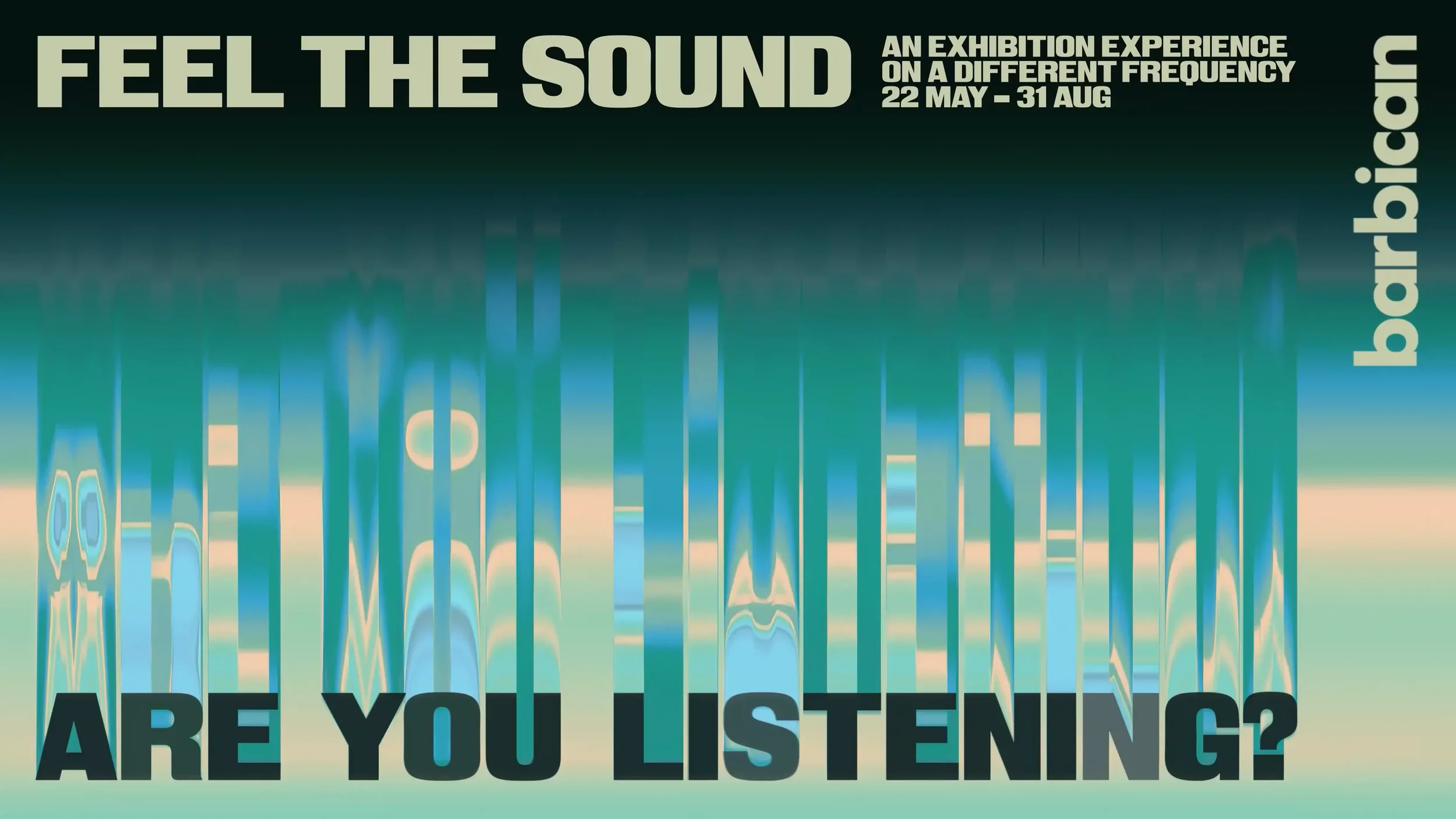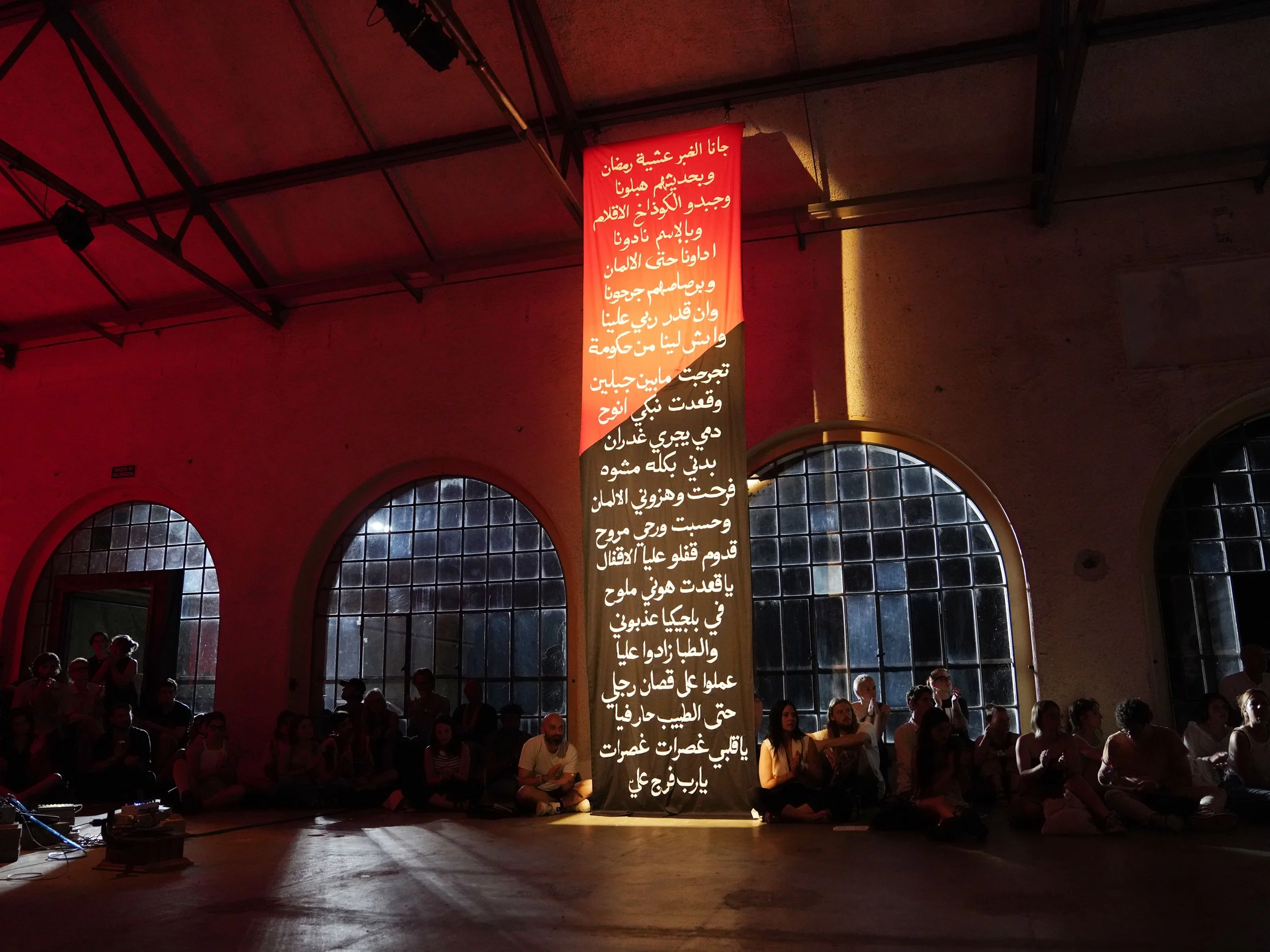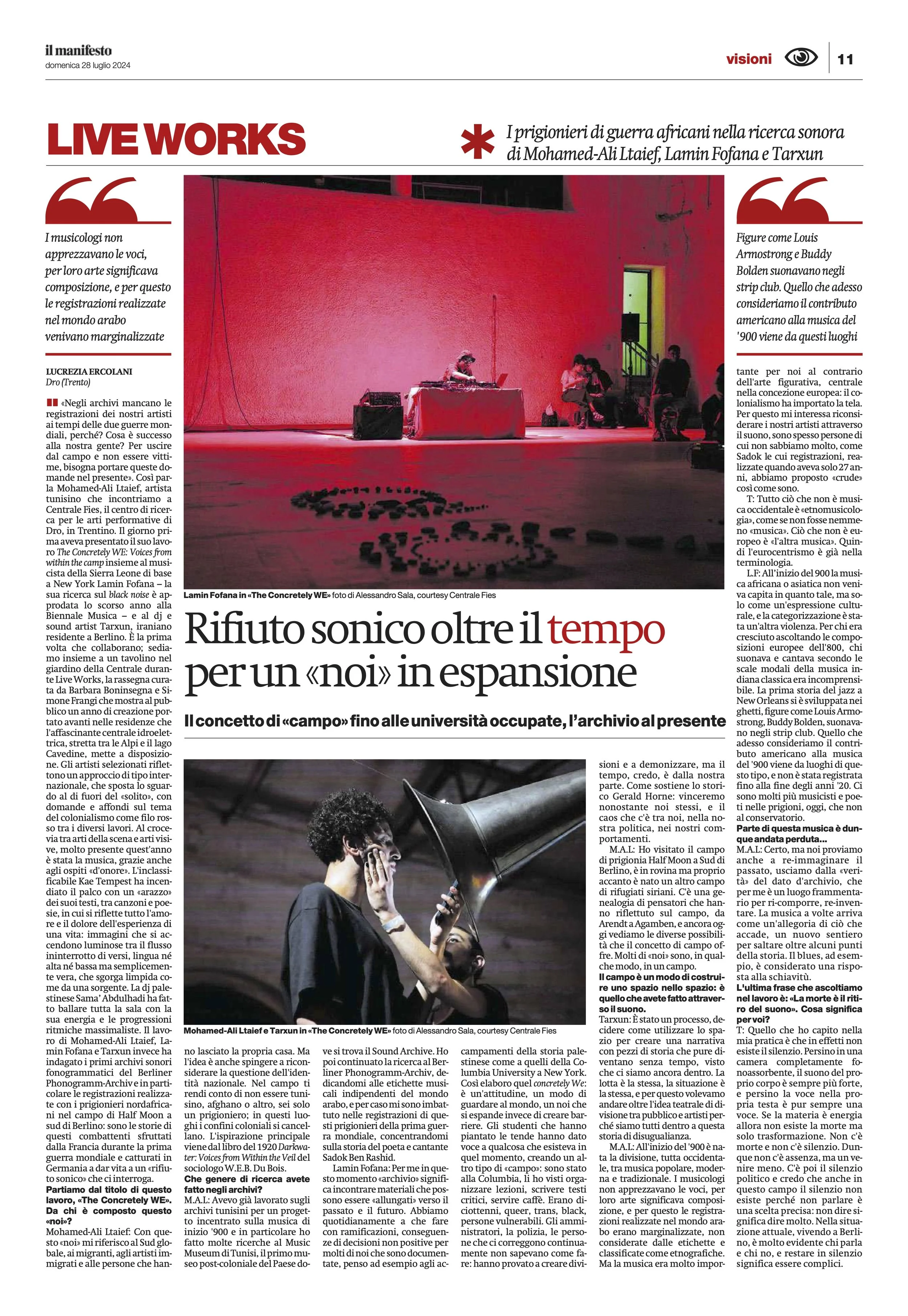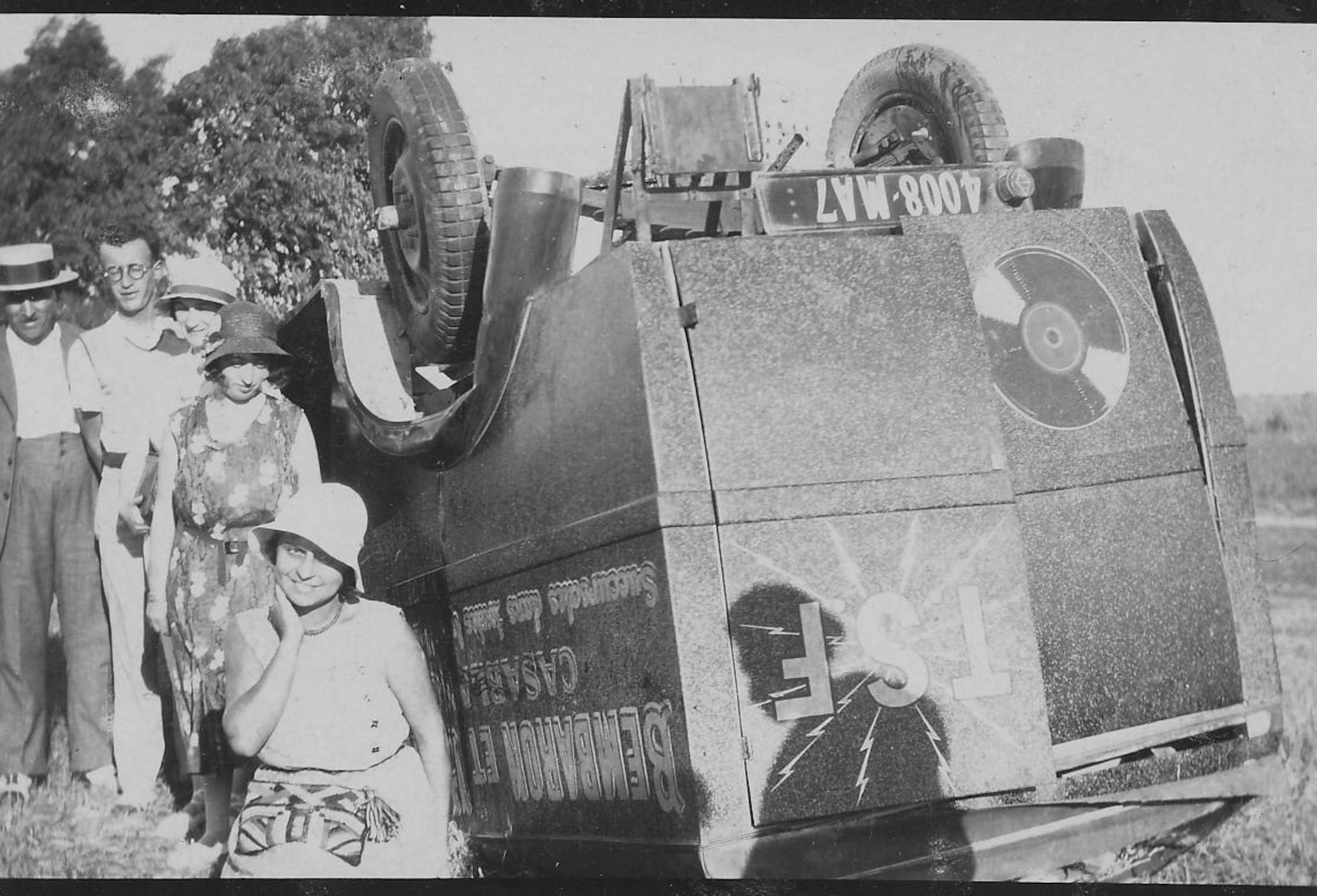Herzliche Einladung zur Lecture Performance: „Die arabische Präsenz im Deutschland der Zwischenkriegszei: Sonic Resistance und die Frequenzen des Widerstands“ von Mohamed-Ali Ltaief in der Refo Kapelle zur Eröffnung der Ausstellung SONIC RESISTANCE
Refo Moabit
Wiclefstraße 32,
10551 Berlin
_____________________________________________
CHRONICLES OF THE HALF MOON
_____________________________________________
FEEL THE SOUND
An exhibition experience on a different frequency
22 May-31 Aug 2025
Barbican Centre, London, England
Co-produced by MoN Takanawa: The Museum of Narratives, Takanawa Gateway City, Tokyo, Japan
Opening in May 2025, the Barbican announces Feel the Sound, a bold new multi-sensory exhibition experience exploring our personal relationship to sound and embracing a world of listening that goes beyond the audio. Through a series of eleven commissions and installations including six new commissions-Feel the Sound-takes place in spaces across the Barbican Centre, from the entrance on Silk Street, in The Curve, the public foyers, to outdoors on the Centre's Lakeside Terrace. For the first time, the Centre's underground Car Parks will also be part of the exhibition experience. Following this premiere run, Feel the Sound will embark on an international tour, including to MoN Takanawa: The Museum of Narratives, Tokyo in late 2026. Frequencies, sound, rhythmic patterns and vibrations define everything around us. From the soundtrack of our environments to the rhythm of our heartbeat, frequencies are constantly creating and changing how we see, hear and feel the world. Feel the Sound is an invitation to awaken the senses, embrace our sonic world and discover the sound in each of us. Each installation will be an opportunity to explore how sound can be experienced in a multitude of ways. By considering our body as a listening device, we can begin to adjust our understanding of ourselves and tune into the world through a different frequency.
Feel the sound
Exhibition Catalogue | Edited by Taous Dahmani
The exhibition will be accompanied by a playful and unique catalogue, influenced by music and sound magazines, designed by Other Office, a multidisciplinary creative practice run by Simon Sweeney & Shauna Buckley, who specialise in visual identities, interactive work, and printed matter.
_____________________________________________
THE CONCRETELY WE:
VOICES FROM WITHIN THE CAMP
_____________________________________________
Kaaitheater Brussels, Belgium
Thursday 23rd and Friday, 24th January 2025
The story of the protagonist 'Sadok Ben Rachid', a Tunisian poet, singer and prisoner of the First World War, overlaps fact and fiction. It is based on research conducted between the archive collections of the Berliner Phonogramm-Archiv, the Lautarchiv Berlin, Frantz Fanon's play 'Parallel Hands' (1949) and other counter-archives. Sadok was a soldier in the North African forces, recruited by the French (1914) and used in the major battles of Europe before being captured by the Germans (1915). He was 37 years old when he made several recordings at the Half-Moon POW camp at Wünsdorf (south of Berlin). On 30 May 1916, at 1.15 in the morning; Sadok stood in front of a horn and sang three war poems. Ltaief's performance research-based project «The Concretely WE: Voices From Within The Camp» investigates and retraces the early phonographic sound archives commissioned and classified in the 1910s. These archives include prompt ethnographic recordings made by the Prussian Phonographic Commission established by Wilhelm Doegen, with a group of linguists and ethnomusicologists who captured the voices of colonial subjects imprisoned in war camps across Germany, producing the following 1,650 shellac records between 1915 and 1918.
Fanon's comprehension of colonial violence paralleled his methods of psychiatry, equating the effects of colonialism with the causes of mental illness; a society that has created a disease that can only be eradicated by dismantling its neurological causes; colonialism and its aftermath. Following Fanon's psychoanalytic and theatrical thought, the performance aims to decipher the consequences of colonialism, the apparatus of capture, the use of the bodies and the understanding of alienation that have produced multiple forms of relational illness. Sadok's existential sonic refusal / poem comes as an autobiographical counter -narrative, a form of resistance or rather survival that acknowledges and raises the notions of ethics and aesthetics for those who usually impersonates the voice’s subject. Through monologues, visual installation, movement and deep listening, the choreographic and sonic acts are evoked, staged and mediated in a language that is both captive and liberating.
concept & text Mohamed-Ali Ltaief | performance Mohamed-Ali Ltaief | with Lamin Fofana and Tarxun The Concretely WE: Voices From Within The Camp | performance part of The Striated Time performance trilogy project | with the kind support of the Mophradat consortium commissions /2023-25 | co-production Centrale Fies, Dro (IT), Kaaitheater (BE), and Tanzfabrik (DE)
| photographs at Centrale Fies Italy 2024 and Kaaistudios Brussels 2025 | ph Alessandro Sala | courtesy Centrale Fies
_____________________________________________
WAYWARD VOICES IN INTERWAR MODERN ART:
GRAMMATOLOGY VERSUS GEO-PHILOSOPHIES
_____________________________________________
Mohamed-Ali Ltaief
Lecture performance
TheMuseumsLab
September 9, 2024
Listening Act II.Mohamed-Ali Ltaief
Wayward Voices in Interwar Modern Art:
Grammatology versus Geo-Philosophies
MohamedAli Ltaief’s lecture performance negotiates and recontextualizes the genealogy of early music records in Tunisia / North Africa and in the diaspora. It situates transnational identities and engages with fragmented biographies of interwar artists, music producers, and dancers who performed in the first decade of the twentieth century. Ltaief expands the connections with the Arab and African Diaspora, specically focusing on singular histories such as the “Baidaphon" music label (founded in Berlin-Mitte 1912); the Tunisian artists they recorded, the involvement of performing and sound artists in the anti-colonial and anti-fascist era in North Africa and in exile. Ltaief’s lecture intertwines with scattered counter-archives that can be read in sound catalogues such as the independent music labels: "Oum-El-Hassen" Tunis 30s, "Rssaissi" Tunis 30s, "Fiesta" Paris 40s, "Maksoud" NYC 10—30s, and "Wardatone" Detroit, USA 50s.
TheMuseumsLab Module 2
SOUND PROGRAMME
Curated by Naima Hassan
to listen without extraction,
selchí:meleqel
what does this sound like?
to kick colonial listening habits,
to shift structures of feeling
Xwlálámethò:m
— Dylan Robinson
Sound programme On Sonic Restitutions and the Public Affects of Phonographic Archives is organised for TheMuseumsLab on Monday 9th, September 2024. Drawing from Dylan Robinson’s Hungry Listening (2020) the programme hosts three listening acts, a panel moderated by Nnenna Onuoha, and evening performance by Elsa M’bala at the Museum für Naturkunde. Organised as a sonic gathering—the panel at Spielfeld Hall addresses the under-examined status of sound in restitution discourse. Recognising the neglected status of sound archives, panellists Anette Homann, Mohamed-Ali Ltaief and Elsa M’bala introduce their critical engagements with colonial sound and early music recordings through research and performative offerings.
The panel begins with an offering by Annette Homann, on the Wolof acoustic traces left by Abdoulaye Niang—recorded during the Royal Prussian Phonographic Commission (1915-1918). The significant German sound collection was established under the supervision of German musicologist Carl Stumpf with a mission to compile a collection of global language recordings that would constitute ‘a new kind of ethnology'.2 This 'Weltarchiv' formed by a group of philologists, linguists, musicologists, and anthropologists recorded the voices of colonial subjects held in internment camps across Germany, resulting in the production of 1,650 shellac records. Contained within these recordings, are echoes of African prisoners held in these camps, their refusals, mued laughers and quiet refrains. Held today at the Humboldt Forum’s Lautarchiv, these shellac records constitute an archival register of African, Asian and European languages recorded under the auspices of German imperial knowledge production.
MohamedAli Ltaief’s lecture performance contends with, and recontextualizes the genealogy of early music records in Tunisia/North Africa and in the diaspora, departing with recordings from the Berliner Phonogramm-Archiv. Closing the panel, Elsa M'bala will oer a gesture towards sonic resocialization featuring the oldest recordings made in Cameroon. The programme will conclude with an evening fellow exchange and sound performance hosted by Elsa at TheMuseumsLab’s 2024 Public Event. Here, she presents Time to listen, a listening session of selected postcolonial African music cassettes from the Ass Niang Collection.
SOUND PANEL
Presentations by Anette Homann, Mohamed-Ali Ltaief & Elsa M’bala
13:30 discussion and Q&A moderated by Nnenna Onuoha
_____________________________________________
THE CONCRETELY WE:
VOICES FROM WITHIN THE CAMP
_____________________________________________
Live Works Summit
July 20th, 2024
The story of the protagonist Sadok Ben Rachid (Tunisian poet, singer, and prisoner of World War I) overlaps with fact and fiction. It is based on research conducted between the archive collections of the Berliner Phonogramm-Archiv, Lautarchiv Berlin, and other counter-archives, as well as Frantz Fanon’s body of work, including the play ‘Parallel Hands’ (1949). Sadok was a soldier of the North African Forces recruited by the French (1914) and used in the major battles of Europe before being captured by the Germans (1916). Following Fanon's theatrical and psychiatric thought, the performance aims to decipher the consequences of colonialism and the understanding of alienation that have produced multiple forms of relational illness. Sadok's existential sonic refusal/poem comes as an autobiographical counter-narrative, a form of resistance or rather survival, acknowledged and raises the notion of ethics and aesthetics for those who usually impersonates the voice’s subject.
Ltaief’s performance art project «The Concretely WE: Voices From Within The Camp» investigates and retraces the early phonographic sound archives that were commissioned and classified in the 1910s. These archives include prompt ethnographic recordings made by the Royal Prussian Phonographic Commission, established by Wilhelm Doegen and assisted by H. Stumme and R. Lachmann with prisoners of the First World War at the “Half Moon camp” in Wünsdorf (south of Berlin) between 1915 and 1918.
Concept, Text Mohamed-Ali Ltaief Performance Mohamed-Ali Ltaief WITH Lamin Fofana & Tarxun Curated by Barbara Boninsegna and Simone Frangi coproduction: Centrale Fies, Dro (IT) Kaaitheater Brussels (BE) and Tanzfabrik Berlin (DE) Mophradat consortium-commissions/2023-2025
_____________________________________________
PARALLEL HANDS — CO-EXISTENCE OF TIMES
AND THE GOOD WILL TO LISTEN
_____________________________________________
performance
Tanzfabrik Berlin
24.02.2024
Ltaief’s research performance project «PARALLEL HANDS — Co-existence of Times and the Good Will to Listen» investigates the legacy of North African sonic archives in the collection of Berliner Phonogramm-Archiv and Ethnologisches Museum in Berlin. It specifically re-traces the early phonogram sound archives that were commissioned and classified during the 1910s and are today settled in ethnomusicological collections stored in Berlin at SMB museums. These archives include recordings made by the German Phonographic Commission, established by Wilhelm Doegen and assisted by Robert Lachmann with prisoners of the First World War, between 1915 and 1918 at the Half Moon camp in Wünsdorf (south Berlin). Some of these prisoners were Tunisian, like Sadok Ben Rashid.
This project critically investigates notions of record and archive, raising questions about ethnological field recording practices under the violence of European Colonialism; about the limits of translation, and the enduring myth of universal art doctrines.
* The double showing is followed by a discussion with the artists *
Concept and text: Mohamed-Ali Ltaief Performance: Mohamed-Ali Ltaief & Tarxun Curated by Barbara Boninsegna and Simone Frangi
coproduction: Centrale Fies, Dro (IT) Kaaitheater Brussels (BE) and Tanzfabrik Berlin (DE) Mophradat consortium-commissions/2023-2025
_____________________________________________
POEISIS, PRAXIS, AND CULTURES OF RESISTANCE
OR THE NON ESTABLISHED HISTORIES OF ART
IN TUNISIA
_____________________________________________
Mohamed-Ali Ltaief
Lecture performance
Archive Books Berlin
Reinickendorfer Str. 17
13347 Berlin
Unpacking our Library #6
Curator Paz Guevara
5 – 6.30 pm
Reading Circle
Workshop as part of
Unpacking our Library #6
Mohamed-Ali Ltaief
By registration: malab@archivesites.org
Based on the ongoing research-based project of an artist that confronts and expands the meaning of sonic archives, Mohamed-Ali Ltaief offers a Reading Circle to share and discuss the genealogy of early ethnomusicological field recording in Tunisia, while reassembling cartographies of interwar artists in North Africa and in the diaspora. In the Reading Circle workshop, Ltaief will share a selection of readings that he refers to in his lecture performance ‘Poeisis, Praxis, and Cultures of Resistance or the non-established Histories of Art in Tunisia’, re-contextualizing cuts and ruptures during colonial times, and unraveling the multiplicity of sonic performative practices. The Reading Circle is open to everyone interested in African performance art histories and sonic performative art practices, anti-colonial and anti-fascist early political movements in North Africa, decolonial theories, and practices of transformation of archives.
7 – 8 pm
Unpacking our Library #6
Poeisis, Praxis, and Cultures of
Resistance or the non-established
Histories of Art in Tunisia
Unpacking Our Library invites Tunisian artist and author Mohamed-Ali Ltaief to re-entangle and negotiate the meaning of a North African sonic archive collection recorded during the first decade of the 20th Century by the Prussian Phonographic Commissions in North Africa, and now stored and dispersed, in part at the Berliner Phonogramm Archiv (SMB) at the Ethnologisches Museum in Berlin and in part at the Ennejma Ezzahra in Tunis. Ltaief’s Lecture performance ‘Poeisis, Praxis, and Cultures of Resistance or the non-established Histories of Art in Tunisia’ questions the dispositive of sonic archival material in those collections by displacing the Ethno-musicological illusion. Through the lecture, Ltaief revoices extended biographies and foregrounds sonic performances, confronting the static sonic archival materiality and the corporate identity of the Western aesthetic taxonomy. By shifting the sonic archive into a spatialized and performative practice, Ltaief opens those archives to art histories across Berlin, Beirut, Cairo, and Tunis. Acknowledging the intrinsic multiplicity of art as a concept of “Poiesis and Praxis’, the lecture is composed of acts of translating lyrics, retracing movements-body language, and re-locating biographies and counter archives. This lecture performance ‘Poeisis, Praxis, and Cultures of Resistance or the non-established Histories of Art in Tunisia’ by Mohamed-Ali Ltaief is a sonic-visual and geo-philosophical narrative that combines sonic testimonies with spatial strategies, border studies, and decolonial aesthetic methods. ‘Poiesis, Praxis, and Cultures of Resistance or the non-established Histories of Art in Tunisia’ by Mohamed-Ali Ltaief is part of ‘the Striated Time’ performance trilogy project and publication. With the kind support of Mophradat Consortium Commissions 2023/25, Jaou Festival Tunisia, and Ennejma Ezzahra Tunis. — Courtesy Center of Arab and Mediterranean Music (CMAM)
Publishing Practices 3
Weaving the Inner Bark Festival
www.archivesites.org
_____________________________________________
THE STRANGENESS OF THE STRANGER
_____________________________________________
sonic performance
Broadcast on Resonance Extra London
25 September 2021 (from midday to midnight)
Text: Abu Hayyan al-Tawhidi, Julia kristeva, Giorgio Agamben, Samuel Beckett. Recording and sound art: Omar Karray / Voices: Marina Resende, Santos, Ayed Fadhel, Rindala Pereverzev and Mohamedali Ltaief.
_____________________________________________
THE PATH OF THE SUN OR THE BARE LIFE
_____________________________________________
performance
Madrasa El Achouria, Tunis
22.06-2021
Mohamedali conducted research during his residency in Tunis on the market of Chinese products: the Boumendil market in the Medina of Tunis. In particular, he investigates the impact of the Chinese market on Boumendi street history/the Medina of Tunis and explores with Omar Karray their particular soundscape.
The path of the sun or the bare life طريق الشّمس أو الحياة العارية
A performance project by Mohamedali Ltaief
with Omar Karray and Rindala Pereverzev
video Imed Aouadi
sound Omar Karray
video performance Slim Baccar
Voices: Marina Resende Santos, Ayed Fadhel,
Rindala Pereverzev and Mohamedali Ltaief.
production manager Wissal Bettaibi
Production of L'Art Rue - Supported by Goethe-Institut Tunis
and the Arab Fund for Arts and Culture - AFAC. Research grants in the field of performing arts/dance 2019 —Senate Berlin.
_____________________________________________
THE PATH OF THE SUN OR THE BARE LIFE
_____________________________________________
research / residency
March_May 2021
L'Art Rue, Tunis, Tunisia
Exile in Arabic is Eghtirab —Moghtareb which means, the person who walks towards the sunset—Ghouroub. The exile is an utopian counter-space as Michel Foucault says in the utopia of the body: “My body is like the city of the sun, it has no place, but it is from itself that emerge and shine all possible places, real ones or utopic ones”.
_____________________________________________
HUNDERT JAHRE WEINEN
ODER HUNDERT BOMBEN WERFEN
_____________________________________________
Theater Basel
18.10-19
Darja Stocker and Mohamed-Ali Ltaief
PREMIERE
”Reto” has been an outcast all his life. From early childhood, he is continually being sent away: from his father in Basel to his mother in Geneva, as a child labourer from one farm to the next. In his search for affection and recognition, he is repeatedly degraded and humiliated. Eventually, he finds himself on a ship from Marseille to Algiers, going to war as a mercenary and trying his luck in the Foreign Legion. The Legion suggests togetherness and security but at the same time, it means constantly living in fear. Finally, Reto is called to account in a court trial and is forced to look back on his life of torment.














